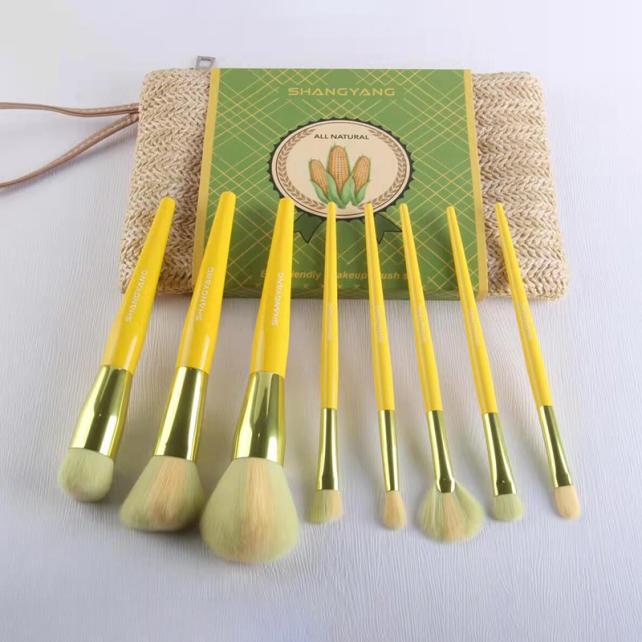When comparing synthetic hair and animal hair for makeup brushes, it’s important to consider several factors including performance, ethical considerations, and cost. The debate over which type is best can be quite nuanced, depending on individual needs and values.
1.Performance
A) Synthetic Hair Brushes:
Material: Made from man-made fibers like nylon and polyester.
Suitability: Ideal for liquid and cream products as they don’t absorb as much product as animal hair.
Durability: Tends to be more durable and easier to clean.
Allergy-Friendly: Less likely to cause allergic reactions, making them suitable for sensitive skin.
B) Animal Hair Brushes:
Material: Commonly sourced from goats, squirrels, and sables.
Suitability: Excellent for powder products due to their ability to hold and distribute powder evenly.
Texture: Often softer than synthetic brushes, providing a more pleasant application experience.
Blending: Superior blending capabilities for certain makeup techniques.
2.Ethical Considerations
- Synthetic Hair Brushes:
Cruelty-Free: No animals are harmed in their production, making them a popular choice among those who advocate for animal rights.
Environmental Impact: Some synthetic materials can be less eco-friendly due to their non-biodegradable nature.
- Animal Hair Brushes:
Animal Welfare: The use of animal hair raises concerns about animal welfare and ethical sourcing.
Natural Resource: As a natural material, animal hair is biodegradable, which may appeal to those focused on environmental impact.
3. Cost and Accessibility
A)Synthetic Hair Brushes:
Cost-Effective: Generally more affordable than animal hair brushes.
Widely Available: Easily found in most beauty stores and online platforms.
B)Animal Hair Brushes:
Price Range: Tend to be more expensive, reflecting the cost of sourcing natural hair.
Limited Availability: May not be as readily available as synthetic options, especially high-quality or ethically sourced varieties.
The Trend Towards Synthetic Brushes
With advancements in brush technology, Makeup brush manufacturers have been able to create synthetic bristles that mimic the softness and precision of natural hair brushes. This allows for seamless application of makeup products, whether it’s blending foundation, applying eyeshadow, or creating precise lines with eyeliner.
▲Shangyang, the leading makeup brush manufacturer, testing new synthetic bristles performance
Another benefit of synthetic brushes is their durability and longevity. Unlike natural brushes, which can shed and lose their shape over time, synthetic brushes are more resistant to wear and tear. This means that consumers can enjoy their brushes for a longer period without having to constantly replace them. Synthetic brushes are easier to clean and maintain because they don’t trap bacteria and product buildup as much.
From an ethical standpoint, synthetic brushes are a more humane choice. Natural brushes are often made from animal hair, which raises concerns about animal welfare and sustainability. Choose synthetic brushes to support cruelty-free and vegan beauty, align with values, and contribute to a sustainable future.
Cost is another factor that drives the preference for synthetic brushes. Natural brushes, particularly those made from high-quality animal hair, can be quite expensive. On the other hand, synthetic brushes offer a more affordable alternative without compromising on performance or quality. This affordability makes them accessible to a wider range of consumers, allowing more people to enjoy professional-grade makeup application without breaking the bank.
In conclusion, the rise of synthetic brushes in the beauty industry is not just a passing trend but a reflection of the changing values and priorities of both brands and consumers. With their improved performance, durability, ethical considerations, affordability, and inclusivity, synthetic brushes have become the go-to choice for many makeup enthusiasts. As the demand for sustainable and cruelty-free beauty continues to grow, it is likely that synthetic brushes will remain a staple in the industry for years to come.
Conclusion
The choice between synthetic and animal hair makeup brushes ultimately depends on individual preferences, ethical considerations, and specific makeup needs. For those prioritizing cruelty-free and allergy-friendly options, synthetic brushes are ideal. However, for enthusiasts seeking superior blending and a luxurious experience, animal hair brushes might be preferable, provided that ethical sourcing is ensured. As the beauty industry continues to innovate, the gap between these two types of brushes is narrowing, offering high-quality options for all preferences.


